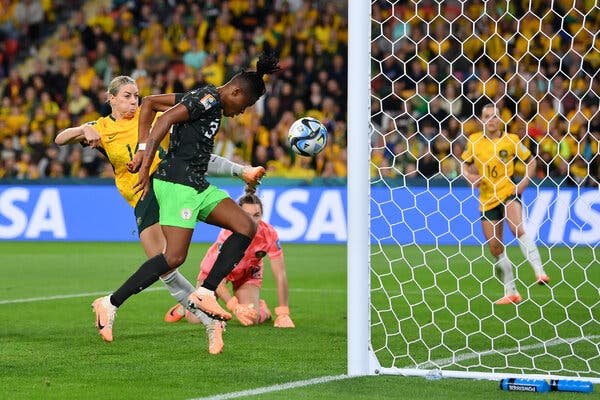
Women’s World Cup: Nigeria Stuns Australia; Portugal Gets First Win

All week, Australian soccer officials have urged the country’s news media and its army of fans to focus on the players healthy enough to take the field for the team representing the tournament co-hosts.
Those efforts have been largely futile, with the fate of star striker Sam Kerr and her injured right calf being the dominant narrative of the country’s World Cup so far.
A victory over Nigeria would have guaranteed a spot in the round of 16, and would have perhaps given some respite and the chance to rest what has become the most talked about calf muscle in Australia for at least one more game.
But a shock defeat to Nigeria, which scored three times after Australia struck first in front of more than 40,000 fans in Brisbane, leaves Australia’s hopes of making it to the knockout stage dangling precariously and the need for a rescue act from Kerr more urgent than ever.
Australia now faces a shootout against Canada, the champion of the Tokyo Olympics, on Monday with anything but a victory likely to lead to an untimely and embarrassing exit for a team that had high hopes of going deep in the tournament. For Nigeria, the path forward is clearer an much more favorable: A tie with already eliminated Ireland guarantees progress.
After requiring a second half penalty to overcome Ireland in a scrappy tournament opener, Australia’s players talked the pressure of being tournament hosts, with the hopes of a country on their shoulders. Against Nigeria, that same anxiety was clearly present.
Passes were fluffed, chances were snatched and arms were thrown in the air in frustration.
With the first half almost up, that fog of uncertainty looked like it had cleared as Australia put together a collection of passes to thread its way through Nigeria. Emily van Egmond, a replacement for another injured Australian striker, Mary Fowler, met the ball and scored with a perfectly timed run.
Van Egmond instantly turned toward the touchline and into the waiting arms of Kerr, whose embrace showed relief as much as joy.
But Australia’s hopes of a peaceful night evaporated almost as soon as the celebrations had died down. Nigeria launched a last attack before halftime, and thanks to a fortunate deflection, the ball found its way to Uchenna Kanu, whose deft finish instantly sucked the joy out of the Australian crowd. A moment of silence hit in the stadium, punctuated by yelps from flecks in the stands where heavily outnumbered Nigerian supporters had gathered.
Nigeria, newly emboldened, scored twice more in the second half as Australia’s anxiety mounted, its scrambled thinking creating the type of openings that Nigeria could not pass up.
Poor defending from a corner from Australia allowed the ball to eventually find its way to defender Osinachi Ohale to score at the far post. A substitute, Asisat Oshoala, then took advantage of a mix-up between defender Alanna Kennedy and goalkeeper Mackenzie Arnold to give Nigeria a two-goal lead that led to delirious celebrations on the Nigerian bench.
Kennedy scored with a header in injury time, but by then the damage had been done, and Australia’s fate, for one night at least, was sealed.
While Nigeria’s players danced in celebration after what is certainly its most eye-catching success at a World Cup, the vanquished hosts huddled, the entire roster taking part in an on-field demonstration of togetherness at a time of crisis.
Yet it will be one name that will now, more than ever, be invoked. The calls for Kerr will reach a fever pitch.
Australia Coach Tony Gustavsson, still reeling from his team’s shocked defeat, acknowledged that Kerr’s health would dominate the days leading to what is now a critical game. “It might even be where we need to test her on game day — that’s how tight it is,” Gustavsson said. He added that he knew Kerr, the team’s leader, would “do anything to be out there.”

Portugal looked much more comfortable in a 2-0 win against Vietnam than it did in an opening loss to the Netherlands.
Telma Encarnação scored a goal in the seventh minute and Kika Nazareth added another soon after that showcased Portugal’s easy control of the match.
It will be very difficult for Portugal to win its next game, which is against a United States team that is tied atop the group standings with the Netherlands. But the Portuguese could also make things tough on the Americans, who will want to score to get out of Group E in first place.
Argentina vs. South Africa
South Africa shocked Sweden in its opening match of this World Cup, scoring in the 48th minute to take the lead over a team that is hoping to contend for the title. While the Swedes eventually eked out a win, 2-1, South Africa proved its pluckiness and will be looking for its first World Cup win when it takes on Argentina on Friday in Dunedin, New Zealand (Thursday night Eastern time).
Argentina is facing a quick turnaround from its 1-0 loss to Italy on Monday. Playing in its fourth World Cup, Argentina is still hunting for its first-ever win. The Argentines have arguably their best shot at 3 points against South Africa, with top-ranked Sweden up next.

Lindsey Horan was still curled up on the field when she decided, enough already.
Enough of getting kicked by players from the Netherlands. Enough of letting the Dutch dictate the game. Enough of the United States women’s team, the two-time reigning world champion, not playing its best at this Women’s World Cup.
Horan and her team were an hour into a physical match against the Netherlands filled with sharp elbows and powerful shoves, and they were losing it by a goal. Now Horan, a United States co-captain, had just been hip-checked hard by a Netherlands counterpart, Danielle van de Donk. So after several minutes of being examined by medical staff, and another moment of being lectured by the referee for shoving van de Donk, Horan did exactly what her teammate Julie Ertz had just begged her to do.
“Just score this goal,” Ertz had whispered as they lined up to await a corner kick from Rose Lavelle, “to shut everyone up.”
And that’s just what she did. As Rose Lavelle’s corner screamed into the penalty area, Horan sprinted for the precise spot where it would arrive. “An absolute dime,” she called the pass from Lavelle. She jumped to meet it, snapped her head and sent the ball straight into the net.
“I don’t think you ever want to get me mad because I don’t react in a good way,” Horan said. “Usually, I just go and I want something more. I want to win more. I want to score more. I want to do more for my team.”
Horan’s goal lifted the United States to a 1-1 tie with the Netherlands, with one more group match game to play for each team. At the moment, the teams are tied with 4 points from a win and a draw, but the United States holds a slight edge on goal difference because it beat Vietnam by three goals and the Netherlands beat Portugal by only one.
The winner of the group will be decided after the third and final matches in the group, which will be played simultaneously on Tuesday. The U.S. will face Portugal, and the Netherlands will play Vietnam.
The United States will enter that game with a new spring in its step, and Horan is the main reason for that. All it took, it turned out, was a bit of rage.
“That’s when you get the best football from Lindsey,” Horan said of herself.
She is not the first U.S. women’s player, of course, to take it upon herself to personally change the team’s trajectory at a World Cup, to will it to victory on soccer’s biggest stage. Think Megan Rapinoe in 2019, or Carli Lloyd in the 2015 final, to take two recent examples. In each case, and in Horan’s on Thursday, a key player suddenly came to personify the team’s history and legacy — four World Cup titles, four decades atop world soccer — and turn the momentum her team’s way.
On Thursday, even Horan’s teammates sensed something was about to change. Forward Alex Morgan said that when she saw the referee pull Horan and van de Donk aside after the two exchanged shoves and heated words following the foul, and just before the corner kick that ensued, she “felt like something was going to happen.”
United States Coach Vlatko Andonovski said the response was typical of Horan.
“She gets fouled, kicked, hurt and obviously it’s a very difficult moment,” Andonovski said. “And instead of crying about it, she just goes and makes a statement, and basically that shows everyone in the world the direction that the game is going to take.”
Andonovski said he was especially proud that Horan and other veterans had continued to press for a winning goal after Horan tied the score, showing the younger players on the U.S. team how to take control of a game. Horan and players like Ertz and Lavelle, he said, “carried the younger ones, or in a way showed the younger ones what this game is all about.”
One of those players, the 21-year-old Trinity Rodman, said she had been impressed by Horan’s ability to “flip a switch” and go “from trash talking to putting a ball in the back of the net.”
It may have been why Andonovski chose to make only one substitution in Thursday’s game, sending on Lavelle for Savannah DeMelo at halftime to try to inject some energy into the U.S. midfield. He refrained from making more changes, he said, “because I thought we had control of the game, I thought we were knocking on the door of scoring a goal.”
“We were around the goal the whole time,” he added, “and I just didn’t want to disrupt the rhythm.”
It was only after Horan’s goal, though, and after being outplayed in the first half, that the United States began to look crisper and more determined.
Andonovski suggested that the final 30 minutes, not the first 60, were representative of what he and fans could expect as the team moves deeper into the tournament, and as the connections between players young and old start to get more familiar.
“What you saw in the second half is what you’re going to see going forward, as a baseline,” he said. “I think that we’re just going to get better from game to game, and we’re going to be a lot more efficient as well.”

Nothing is 100 percent certain, of course, but the chances are highly likely that the United States and the Netherlands will both get through their World Cup group and into the round of 16. But the question of who places first and who places second is going to be complicated, and its implications are not trivial.
The competitive part of it will be of utmost concern to the teams. The first-place team could face an easier path in the knockout rounds than the runner-up: a game against a youthful Italian team in the round of 16, say, rather than a showdown with Sweden, a title contender that reached the final at the Tokyo Olympics and finished third in the 2019 World Cup.
Beyond the matchups, there are practical and logistical issues for the teams, and their fans, as well — from flights to hotel reservations to match tickets. All of those are now dependent on the results of the final group games on Tuesday.
And then there is the broadcast schedule. For fans in America, for example, the United States’ finish in the group means the difference between watching a round-of-16 game in the evening hours or in the middle of the night.
Thursday’s tie between the United States and the Netherlands means none of that will be locked in until Tuesday, when the scores will set the standings, and the race to prepare for the next round will begin.

They pushed and they shoved. They gave as well as they got. They traded shots and then they traded goals. But through 90 supremely physical — and at times thrilling — minutes on Thursday, the United States and the Netherlands could not separate themselves at the Women’s World Cup.
And so they walked off after the most eagerly anticipated game of the group stage with a 1-1 draw that will have to be good enough.
The Netherlands, which scored first, may regret that it didn’t come away with a win. But not too much. “I think we’re definitely not unhappy,” Jill Roord, who scored her team’s goal, said of the mood in the dressing room.
The United States, which produced far more scoring chances, may feel it deserved one. Its goal, from Lindsey Horan, came after several good opportunities and was followed by a half-dozen more. “At that point it was our game,” Coach Vlatko Andonovski said. “And I’m just disappointed that we didn’t score more than one.”
The United States and the Netherlands know each other well, of course. This game was a rematch of the 2019 World Cup final, but also of a second meeting, a year later, in the Netherlands, and a third at the Tokyo Olympics in 2021. The United States won all of those games. But even its playmaker, Rose Lavelle, admitted that these were different teams, with different coaches and different styles. So perhaps it was not a surprise that the result was different, too.
The game at Sky Stadium was a bruising affair, a frigid day marked by tough tackles and professional fouls that at times felt it was only a moment or two away from boiling over. In the end, though, it was decided by two small moments.
The first was a slip by U.S. defender Crystal Dunn in the 17th minute that set off a scramble finished by a hard, low shot by Roord that sneaked past U.S. goalkeeper Alyssa Naeher.
The second moment, the United States’ response, came after yet another hard foul in the 62nd minute. Dropped by a tackle in front of her team’s bench, Horan, the U.S. co-captain, dusted herself off, strode straight to the middle of the penalty area for a corner kick by Lavelle, and then threw herself at it to deliver the header that tied the score.
The United States pressed relentlessly for a winner from there, but the Netherlands — seasoned by history, improved by its past encounters against the Americans — hunkered down and fought off every one of them.
The result left the teams tied atop Group E with 4 points from a win and a draw, and crunching the math that it will take to win the group and reach the knockout rounds. For now, that edge goes to the Americans on goal difference, plus-3 to plus-1, but that could change over the final group games.
The United States will face Portugal on Tuesday, a game that will be played simultaneously with the Netherlands’ game against Vietnam. The Americans and the Dutch will not see each other again unless they both reach the final. Gritty performances like Thursday’s suggest that both teams may have the mettle to hang around for a while.


